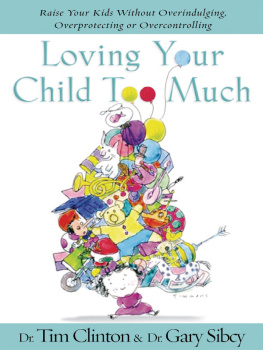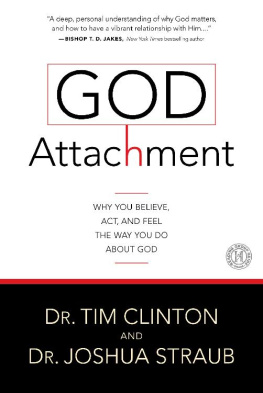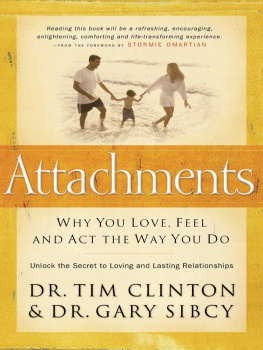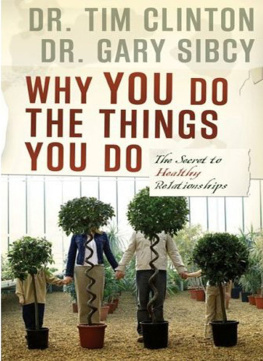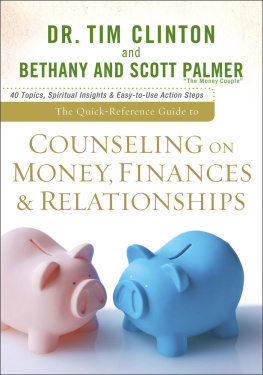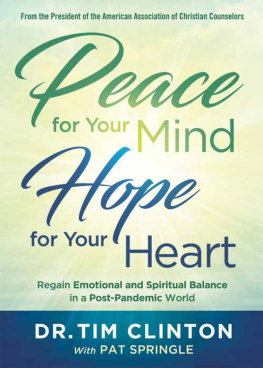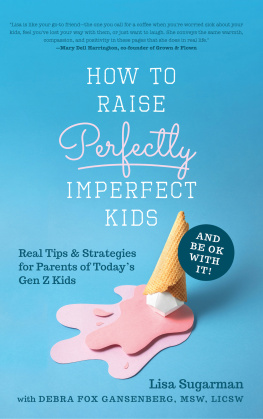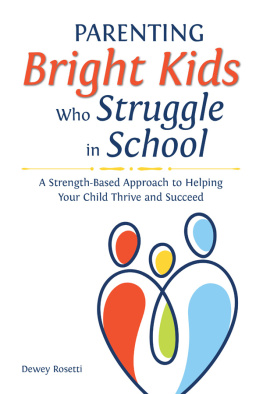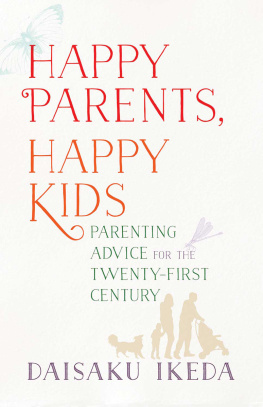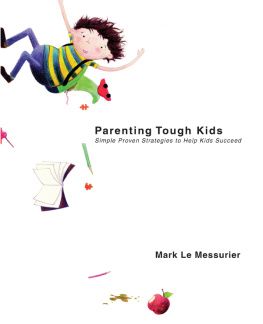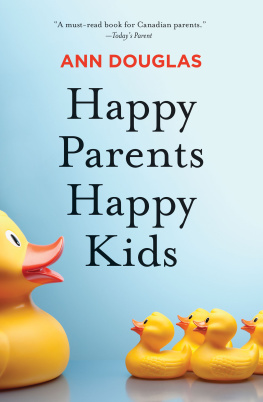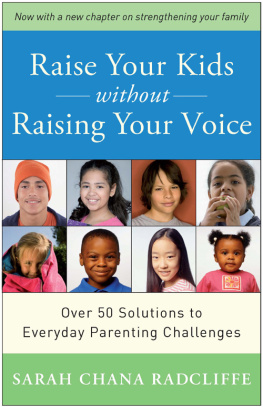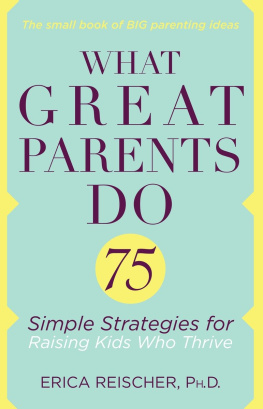
LOVING YOUR
CHILD TOO MUCH
How to Keep a Close Relationship with Your Child Without
Overindulging, Overprotecting, or Overcontrolling
LOVING YOUR CHILD TOO MUCH
How to Keep a Close Relationship with Your Child Without Overindulging, Overprotecting, or Overcontrolling
Copyright 2006 by Dr. Tim Clinton & Dr. Gary Sibcy
Published in Nashville, Tennessee, by Thomas Nelson.
Thomas Nelson is a registered trademark of Thomas Nelson, Inc.
Thomas Nelson, Inc., books may be purchased in bulk for educational, business, fund-raising, or sales promotional use. For information, please e-mail SpecialMarkets@ThomasNelson.com.
All rights reserved. No portion of this book may be reproduced, stored in a retrieval system, or transmitted in any form or by any meanselectronic, mechanical, photocopy, recording, or any otherexcept for brief quotations inprinted reviews, without the prior permission of the publisher.
Unless otherwise indicated, Scripture quotations are taken from The Holy Bible, New International Version Copyright 1973, 1978, 1984 by InternationalBible Society. Used by permission of Zondervan. All rights reserved.
Scripture quotations marked (NLT) are taken from the Holy Bible, New LivingTranslation, copyrighted 1996. Used by permission of Tyndale HousePublishers, Inc., Wheaton, Illinois 60189. All rights reserved.
Cover Design: DeAnna Pierce, Bill Chiaravalle-Brand Navigation, LLC.
www.brandnavigation.com
Interior Design: Teresa Billingsley
ISBN: 978-0-7852-9777-2 (TP)
ISBN: 9-781-59145-045-0 (HC)
Printed in the United States of America
11 12 13 14 15 QG 9 8 7 6 5 4 3 2 1
contents
Whats the Harm in Loving Too Much?
Loving Without Overcontrolling
Extra-Effort Kids
Is it possible to love your child too much? This question is often asked and rarely answered clearly. Its a difficult balance: loving your child well without overindulging, overprotecting, or overcontrolling. In these pages, we will help parents achieve that balance as well as address other questions such as, How do I distinguish between showing love and spoiling? How can I strengthen my relationship with my child? How do I incorporate biblical rules and limits into parenting? and How can I help my child better resolve his behavior problems?
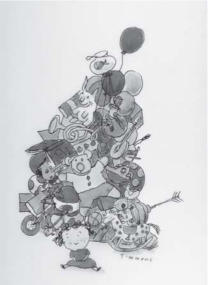
LOVING YOUR CHILD
TOO MUCH

Every child deserves at least one person in his life who is absolutely crazy about him.
P arents love their kids. Its only natural. How moms and dads show love to their kids often differs, but that special bond between parent and child is something that has a heart of its own, something that comes directly from above. Its sacred!
Remember when you first held that tiny, wonderful being and felt your babys warm, smooth skin? Something happened inside that locked your heart with that little ones. At the moment, you didnt believe it would be possible to love someone more, but over time your connection actually grew stronger. With the first smile, tooth, hug, steps, and wordsstarting with Dada and Mama and later progressing to Can I have some money?your love for your child deepened.
Enter sports. You cheered wildly as he hit his first tee-ball, scored a goal, or made a basket. Thats what Im talking about! you screamed. Thats my boy! Were talking big leagues here! You just knew hed be gooda real chip off the old block. And if the coach pulled him out of the game? It wouldnt be pretty. No onethats right, no onebetter mess with your kid.
Youre smiling because you know what were talking about.
As parents and professional therapists, we love our kids with the same gusto. We know the joys, demands, and pressures of raising kids today. And weve seen just about everythingboth in counseling sessions and on the court and ball field. More importantly, weve witnessed what works with kids and what doesnt.
This book is written to help you connect with your kids by identifying and explaining some of the most common pitfalls of parenting. It doesnt pull any punches or offer any gimmicks. It centers on what really matters mostbuilding and maintaining a healthy, loving relationship with your children that is emotionally and spiritually close.
BRIDGING THE LOVE GAP
So what is healthy love? Its more than the powerful bond parents feel when their newborn is first placed in their arms, the rush of infatuation couples experience when they begin dating, or the instant bonding that can happen when friends meet. Whether with family or friends, loving relationships take work. They may begin with powerful feelings, but in order to develop Our kids are no exception. We cant count the number of times parents have said to us, We love our child, but we really dont like him. Hes so exhausting to be around.
The apostle Paul described love as hard work, writing, Love is patient, love is kind. It does not envy, it does not boast, it is not proud. It is not rude, it is not self-seeking, it is not easily angered, it keeps no record of wrongs. Love does not delight in evil but rejoices with the truth. It always protects, always hopes, always perseveres. Love never fails (1 Corinthians 13:48).
Most parents we meet strive to love their children with these biblical guidelines in mind. But what happens when their efforts fall short? The love gap is the distance between our good intentions as parents and what we should do to truly love our kidsand it is often what brings families to our offices seeking help. There are many reasons this separation happens, and often the disconnect occurs when parents overcontrol, overprotect, or overindulge their child.
In a speech about fatherhood, President George W. Bush noted this disconnect, saying, Its a natural longing of the human heart to care for and cherish your child, but this longing must find concrete expression. Raising a child requires sacrifice, effort, time, and presence. And there is a wide gap between our best intentions and the reality of todays society.
We cant really love our kids too much. When it comes to parenting, loveand the amount of itisnt really the issue. Despite our good intentions, we dont always achieve healthy
LOVE COMPARISON CHART
PARENTS WHO GIVE HEALTHY LOVE | PARENTS WHO OVERPROTECT | PARENTS WHO OVERCONTROL | PARENTS WHO OVERINDULGE |
See children as gifts | See children as fragile | See children as little versions of themselves | See children as possessions |
Nurture kids to be unique | Nurture kids to be safe | Nurture kids to be perfect | Nurture kids to be entitled |
Are respectful and supportive | Lack respect and are overly supportive | Lack respect for their child | Are overly supportive |
Are kind and firm | Are kind, not firm | Are firm, not kind | Are kind, not firm |
View mistakes as opportunities to learn | Allow no opportunity for mistakes |
Next page
